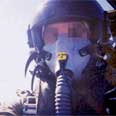
‘I’m here to evacuate you’
Religious F-16 pilot slated to head one of settlement evacuation teams talks to Ynet about the preparations, misgivings, and fears ahead of what is shaping up as one of the most controversial moments in Israel’s history
The 22-year-old religious F-16 pilot, whose name cannot be disclosed due to security considerations, will head one of the teams slated to execute the Gaza Strip and northern West Bank pullout this summer. He says he enlisted in the army to fight external enemies, but now finds himself about to be pitted against his own citizens.
“It’s a very difficult mission,” he says, “but a failure to implement the mission would have disastrous implications.”
Fearing settler violence
In an exclusive interview with Ynet, A. talks about the misgivings involved in taking part in one of the most controversial missions the IDF has ever been tasked with.
“The first thing, when I get to the house and the family (to be evacuated,) I will attempt to talk to them as a human being, as a civilian talking to a human being,” he said. “If they’ll be in the middle of breakfast, I’ll leave and go to another house, in the most sensitive manner possible.”
“I will tell them ‘good morning, we came to evacuate you from your home, please leave by yourself’,” A. says.
He knows mere dialogue might not be enough to elicit the hoped-for response, but insists he will do his utmost to attempt to resolve the problem through words.
“We’ll do it in the least painful way,” he says. “If they tie themselves up, we’ll free them and if the resistance will be stronger we won’t be the ones to implement the evacuation, but rather, other forces, mostly the police.”
Although A. says he does not fear for his life despite the prospect of settler violence, he is very concerned about the possibility of settlers opening fire.
“If that happens, I don’t want to think about what will happen after that,” he says. “I really hope the other forces, who will be very skilled, will know how to handle it, because from here the rules of the game are different.”
‘It’s a trauma’
A. says most of the preparation work undertaken by troops slated to take part in the evacuation had been focused on psychological aspects, such as how to remove a baby from a home or separate him for his mother.
“At the end of the day, and that’s the most important thing, my objective is that (the evacuees) come out of this with as little mental damage as possible,” he says. “After all it’s a trauma, for both evacuators and evacuees.”
The pilot also says he realizes his actions during the pullout would be examined very closely.
“We assume the entire country and the world will be looking at us with a magnifying glass,” he says.
There are many questions A. and his crew are grappling with, he says, including how to behave during the evacuation and whether to engage in conduct that would be completely normal under different circumstances.
“Can we smoke, or should we not smoke. Laugh, or not laugh. We’re trying to formulate an answer,” he says. “We’re walking into the unknown, and there will be things we’ll have to deal with on the ground.”
‘Rule of law is more important’
Despite leading rabbis’ edicts against settlement evacuation, the kippa-wearing A. says he never considered following the rabbis’ orders as opposed to the army’s orders, even though the pullout also contradicts his ideological beliefs.
“This is a mission that in one way or another contradicts Zionism,” he says. “I asked myself this question, and answered that there are things more important than settling the land of Israel, namely the people of Israel.”
“This (pullout) puts a question mark on Zionism, but the law, the rule of law, is much more important,” he says. A. also says he assumes his parents and other relatives would do the same if they were in his shoes.
Finally, A. says he believes his team will be able to carry out the mission and evacuate the settlements, despite the pain involved.
“I don’t want to think about what will happen if we don’t succeed,” he said. “If the IDF doesn’t succeed, it’s a great danger for the State of Israel. Also in terms of the rule of law, the enemies around us and our citizens would think there is no democracy, and each person can do what he wishes.”
The pilot says he also asked himself whether he should be the one to execute the evacuation, and the answer was “yes.”
“I will do it. We’ll do it in the best way possible, and particularly in the most sensitive way possible,” he says.










